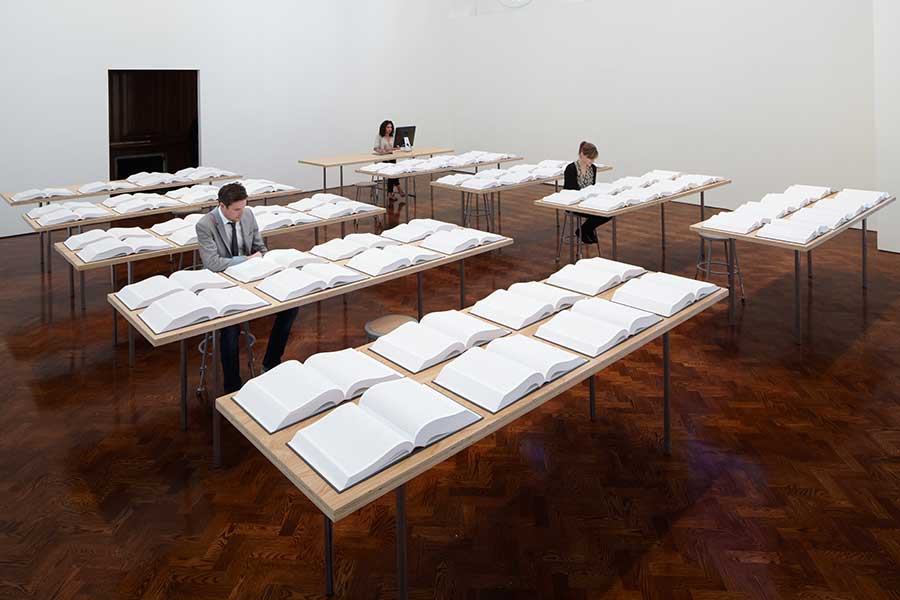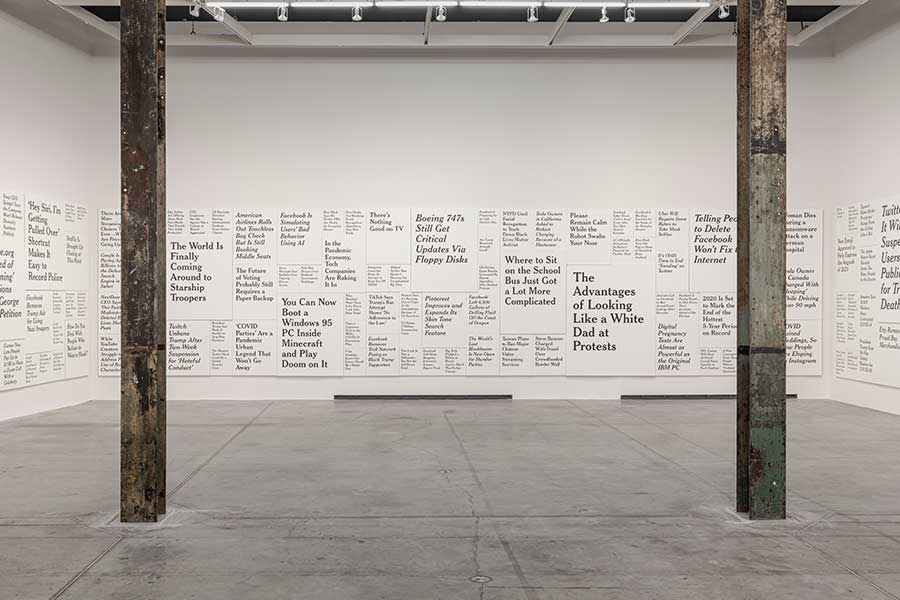From Slander’s Brand
The three-person exhibition features artworks that are durational, monumental, and archival in nature. Each is the culmination of years of artistic labour created in response to pivotal moments of historical transformation and trauma. Individually, and in the dialogue between their works, Hannah Darabi, Rachel Khedoori and Ron Terada ask how art—through archival acts that parallel reportage—might act as witness, interlocutor, and critical reflector. At heart is the question of how artworks give form to events that defy description.
The title is taken from an epitaph dedicated to Herodotus, whose “Histories” are reputed as the first western history to be written and published. However, because his writing was discursive, and employed storytelling and folktales, critics at the time also branded him 'The Father of Lies'. As this epitaph suggests, he was driven into exile because of the criticism:
Herodotus the son of Lyxes here
Lies; in Ionic history without peer;
A Dorian born, who fled from Slander's brand
And made in Thuria his new native land.
Hannah Darabi
Hannah Darabi’s Enghelab Street, a Revolution Through Books, Iran 1979-1983 casts a broadly curated lens on the sociopolitical turmoil induced by Iran’s Islamic revolution, in the form of an archive of political fanzines, photobooks, cultural magazines, documentary photography and ephemera produced during the years spanning the decline of the Shah’s government in 1977 through the consolidation of the post-revolutionary government in 1983. This transitional period offered a moment of freedom as well as uncertainty in a time when experimentation with new political and artistic ideas was occurring.
Enghelab Street refers to an avenue in Tehran known for its publishing houses and bookshops, the Persian word “enghelab,” meaning revolution in English. After the violent breakup of the Iranian government in 1979 in which the Shah’s government dissolved and Ayatollah Khomeini came into power, the publishing community on this street blossomed, and both publishing houses and photographers alike experienced a momentary taste of liberty known as the “Spring of Freedom.” After 1983, much of this experimental work became subject to censure, and Darabi spent years collecting and reassembling books and photographs from this time into an extensive installation and an award-winning artist’s book.
Hannah Darabi (b. 1981 in Tehran, lives and works in Paris) is an Iranian artist and photographer. She studied at Tehran’s College of Fine Arts and then at the University of Paris VIII-Saint-Denis. Although she now lives in Paris, her country of origin remains the main subject of most of her photographic series, in which her photographs interact with other materials, such as text, archival images, music and objects, to show the unique political situation and economic conditions in her country. Among many honors, in 2019, Enghelab Street, a Revolution Through Books, Iran 1979-1983 earned the Historical Book Award at the Rencontres de la photographie d’Arles; and in 2023 Hannah Darabi was granted the Bernd and Hila Becher Promotion Prize by the City of Düsseldorf for her outstanding contribution to photographic art.
Rachel Khedoori
Rachel Khedoori’s Untitled (Iraq Book Project) [2008 to 2010] consists of a collection of news source articles complied into large books. The first articles are dated to the start date of the Iraq war on March 18, 2003, and continue for roughly six years. These articles were found by searching for the words “Iraq,” “Iraqi” or “Baghdad” in the headlines. The articles are formatted chronologically and are from news sources around the world, all translated into English. They are laid out on the page in a condensed fashion so that the texts run continuously from one to another; allowing only the bold lettering of the title, date, and source of the article to distinguish one from the next.
At this point there is collection of 70 books that will be displayed sculpturally, chronicling articles dating from March 2003 to the end of 2008. Serial in its form, the work also represents the near impossibility of documenting something that is in constant flux, affected by time and place. This is an attempt to bring forward the vast complex of words that lay forth the indescribable.
Australia-born, Zurich-based artist Rachel Khedoori is known for work that reinterprets the architecture of domestic or familiar spaces. She often reconstructs rooms that challenge viewers' perceptual experience by interweaving mirrors, films, and scale models into an installation. Khedoori also utilizes books, film, and photography to symbolize the act of documentation, encouraging viewers to reconsider the conditions of reportage and representation. Her work serves as a metaphor for the instability of memory and challenges viewers to reconsider the boundary between reality and imagination.
Khedoori gained international recognition with her first comprehensive solo exhibition at Kunsthalle Basel and Kunstverein Braunschweig in 2001. She studied at the San Francisco Art Institute, as well as the University of California in Los Angeles CA.
Ron Terada
Ron Terada’s TL; DR (2021), also looks at a specific historical moment, in this case 2020, a year in which the lockdowns caused by the global Covid pandemic, the widespread protests following the police killing of George Floyd on May 25 and the electoral victory of Joe Biden in the US presidential elections, which would lead to the storming of Capitol Hill in Washington, D.C. on January 7, 2021. TL; DR comprises 473 paintings, of which the last and most ambitious cycle, included in From Slander’s Brand, totals 325 paintings. When displayed, the paintings are hung end to end and top to bottom of the wall to create a continuous frieze measuring 10 feet in height and 205 feet in length.
Each painting in TL; DR reproduces a 2020 headline taken verbatim from the American technology news website theverge.com, and renders it in Cheltenham, the typeface used by The New York Times. With TL; DR—Internet shorthand for “too long; didn’t read”—Terada addresses the fragmentation of attention caused by the deluge of online content through a meticulous, persistent act of labour. By translating a transient flow of ephemeral news information into a monumental history painting of one transformational year, he invokes a buttress for memory, and an indelible act of recollection.
Ron Terada (b. 1969 in Vancouver; lives and works in Vancouver) has developed a wide-ranging conceptual art practice over more than two decades, which includes painting, photography, video, and music, as well as publications, posters, billboards, and signage. Most of Terada’s work is text-based, appropriating material from a variety of sources, from pop culture to conceptual art. Terada is a graduate of the Emily Carr College of Art and Design. In 2006, he was awarded the Victor Martyn Lynch-Staunton Award, Visual Art, from the Canada Council for the Arts, and in 2004, he won the VIVA Award, Jack and Doris Shadbolt Foundation for the Visual Arts, Vancouver.
Learn More
On Terada: A recording of a conversation between Ron Terada and Dieter Roelstraete
When Art Is Freighted with the Weight of History, Where’s the Light? by Dorothy Woodend for The Tyee
Generously supported by
Mark and Diana Sawers
Terrence and Lisa Turner
Bruno Wall
Banner Image: Rachel Khedoori, Untitled (Iraq Book Project), 2008-2010. Installation view: Hauser & Wirth London, 2010. © Rachel Khedoori. Photo: Peter Mallet. Courtesy the artist and Hauser & Wirth.





